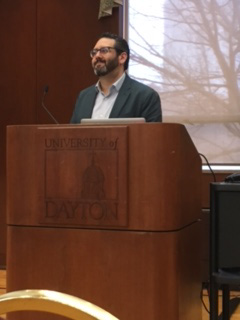TORCH event sparks discussion on social injustice
“Sing instead of talk, dance instead of walk,” Samuel Dorf, assistant professor of musicology, proclaimed on Wednesday, Jan. 18, at the Raising the T.O.R.C.H. in Honor of Dr. King event on campus. Dorf’s words discussing the power of art in political and social movements resonated in the Kennedy Union ballroom and in the ears of students and faculty.
 Raising the T.O.R.C.H in Honor of Dr. King was UD’s rendition of a campaign, #J18, to embrace campus teaching, organizing and resisting unjust policies and agendas that hinder the safety and equality of many inhabitants of our nation by utilizing nonviolent, yet powerful examples, like the Rev. Dr. Martin Luther King Jr. The intention: to stir discussion and to equip students and faculty with the interdisciplinary tools they need to face injustices.
Raising the T.O.R.C.H in Honor of Dr. King was UD’s rendition of a campaign, #J18, to embrace campus teaching, organizing and resisting unjust policies and agendas that hinder the safety and equality of many inhabitants of our nation by utilizing nonviolent, yet powerful examples, like the Rev. Dr. Martin Luther King Jr. The intention: to stir discussion and to equip students and faculty with the interdisciplinary tools they need to face injustices.
“As an academic community, as in intellectual community, we have a certain responsibility to be outward-facing, to reflect, to teach, and to comment on things like our society, our culture, our politics,” stated Joel Pruce, assistant professor and coordinator of the T.O.R.C.H event.
Centered on the work of King, the event linked UD with college campuses across the U.S., including UCLA, Columbia University, and Texas State University, which celebrated through similar educational events.
“I care about working for justice. I am involved in stuff, but I am always wondering what I can do next?,” said Bradley Petrella, a junior international studies and Spanish double major, in reaction to T.O.R.C.H.
With speakers hailing from many departments, discussion topics ranged from the intersection of Christianity and social struggle to significant parallels between Mahatma Gandhi and King’s methods of civil disobedience to the meaning behind Beyoncé’s recent album, Lemonade.
“We are in considerable positions of privilege here. We have freedom," Pruce said. "We are protected by academic freedom in this community to speak freely, to comment, and to be provocative and to teach. And, so, to use that that privilege and position and freedom to focus on controversy and crisis.”